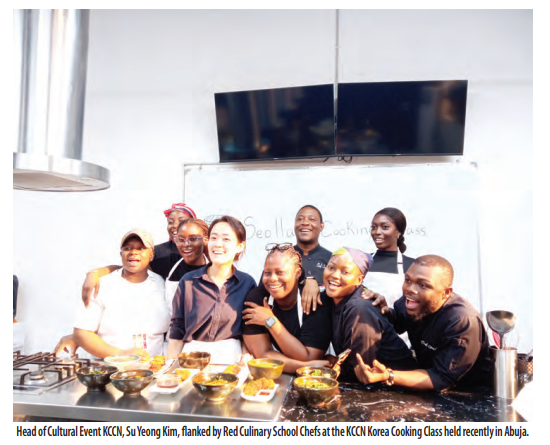When Korean Culture Center Nigeria (Nigeria) kickstarted its Korean Cooking Class for professional chefs in Nigeria, last year, the aim was threefold – to educate the chefs on the difference between Korean and other Asian dishes; to get Korean cuisines in the menus of Asian restaurants in Nigeria, and to foster the cultural exchange between both countries via swapping of cuisines.
And how best can cultural exchanges be fostered if not through food, where you best of one culture with another to give the foodies, a taste of their own culture whilst simultaneously experiencing and appreciating another culture. This is known as Fusion Cuisine.
It is in Afro Fusion cuisine – a style of cooking that combines African spices and ingredients with food from other parts of the world, that Nigerians chef see a future culinary innovation between Nigeria and Korea.
Speaking at the third Korean Cooking Class for Chefs organized by the KCCN at the Red Dish Culinary School for eight participating chefs, Chef Muneera Tahir aka Chef Muse, is already afire with ideas of how to switch up the Korean Seollal (New Year) dish – Rolled Dumpling Soup, and Vegan snack, Wanja Jeon (Pan-fried Tofu Vegetable Balls), they made in class.
“I just had an idea based off the Rolled Dumpling Soup we made today. I thought about incorporating some of our Nigerian spices to the soup will give it an interesting flavour. Adding the Nigerian yellow (Nsukka) pepper, to the soup would elevate the soup. There is a future here, with fusion food.”
Factoring in Nigerians palette, which she said is on the reserved and spicy side, Chef Ogechukwu Oche is optimistic that through Afrofusion cuisine “we can use most of the things we learnt today, to fuse them into some of our African dishes.”
Pastry Instructor at the Red Culinary School, Chef Samuel Akinlaja who benefitted from the introductory part of the class which highlighted the differences between Korean sauces from other Asian sauces, is ready to experiment with the largely fermented sauces of Korea.
“Almost everyone knows how to cook Chinese food, but learning about Korean dishes and that Korean sauces are different from the Chinese, was new for me today.
“I am more interested in the Korean sauces like the soya sauce, the bean paste, and the tomato pastes they presented us today. As a pastry chef, my interest leans towards pastries. I will be opening up a pastry truck very soon, and I will like to try out some of the pastes to see if they go well with the meat pie, chicken pie, shepherd’s pie and other kinds of pastries.”
Thus far, the Korean Cooking Class helmed by KCCN Culture Events Manager, Su Yeong Kim, has trained over 57 chefs on four Korean cuisines. The impact is yet to be determined. Although she admits that the global Hallyu Wave has popularized Korean cultures including K-cuisine, it can only do much in promoting Korean food, hence, KCCN’s focus on Korean cooking challenges, and themed cooking workshops featuring Seollal and Winter-based foods.
The centre is further taking things up a notch via its Korean Food Festival set to hold June/July 2024. The festival is targeted at Nigerian chefs in preparation for the festival’s cooking competition. Chefs across the country can participate in the three-phased festival’s competition.
“They can apply first, via the Online Competition – where we will set a test for the chefs (professional or amateur is inconsequential) where they’ll perhaps make a Korean food.
The results will be judged via videos and images.
The main, and final competition will be held in Abuja.”
“We expect that having experienced Korean food, it will motivate to make fusion foods. I have many Nigerian chefs cook foods from cultures of the world. Perhaps knowledge of Korean food can foster culinary innovation.”




